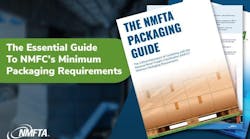For Graebel Companies, mandating driver safety was not enough to ensure its fleet of drivers operated safely. There had to be a better way.
“Fleet safety improves when individuals buy into the idea,” says Robert Shofstall, safety director at Graebel Companies. “Policies mandating behavior can be written, but a ‘you will comply’ approach is usually ineffective. It's essential to communicate in ways that drivers can relate to, and [for everyone to] learn to understand each other.”
Founded over 60 years ago, Aurora, CO-based Graebel provides domestic and international moving and storage services. In the U.S., the company operates almost 1,200 trailers and employs the services of nearly 1,000 independent drivers.
Understanding drivers is something Shofstall does extremely well. Growing up, he learned the business from a father who drove moving trucks and has worked for Graebel since 1994. The company's safety record was a top concern for him when the former driver joined the safety department in 2005. In 2008, he became safety director.
“We looked at all types of violations that were causing poor safety scores,” he says, “and began to address them by talking to drivers, providing training and establishing practices that help reduce violations.”
These efforts have paid off at Graebel, culminating in a series of annual awards from the American Moving & Storage Assn. (AMSA). In March of this year, at AMSA's 2011 Education Conference & Expo, Graebel won the association's 2010 Fleet Safety Improvement Award for demonstrating the best two-year improvement in its accident rate.
In 2009, Graebel was honored by AMSA with its Safety Initiative Award for “implementing a comprehensive safety control policy designed to eliminate driver and vehicle violations discovered during DOT roadside inspections, and improve its overall safety program, which includes a reduction in accidents.” In the last two years, Graebel has also had two drivers receive AMSA Super Van Operator Awards in the Rookie of the Year category.
TIGHT CONTROLS
Strict driver qualification and training requirements contribute to safety at Graebel. “All drivers are required to attend a three-day training class, which covers not only safety but also claims prevention, customer service and paperwork compliance,” Shofstall explains. “In addition, drivers must complete this training every five years, and we use online training and safety training articles to keep everyone up to speed.”
Graebel monitors driving habits by utilizing Is My Driving Safe, which is an outside vendor. The company's professional monitors report to the safety department on driver speed; following distance; and lane, turn signal, and seat belt use. The department follows up on every report, which can include video, and audits the driver's log against the date, time and location of the report.
“When a driver at Graebel violates a policy, we follow up with a conversation explaining the problem and the corrective action that needs to be taken,” Shofstall explains. “A violation can mean mandatory attendance at a defensive driving course, or even a suspension.
“While drivers who can't measure up are out of the game,” Shofstall adds, “we are just as quick to reward them for doing things properly and safely. Those drivers get a letter of commendation, a gift card and a personal call from me.”
Shofstall credits much of Graebel's success in improving the fleet's safety record to the emphasis the carrier places on communicating with drivers. By all accounts he's in regular contact with every driver, including all new hires.
“All of our initiatives are focused on making measurable improvements in the number of vehicles involved in crashes and the number of violations, leading to a steady improvement in our safety scores,” Shofstall says. “By taking the time to listen and talk, we can help drivers adopt behaviors that continually improve safety.”


